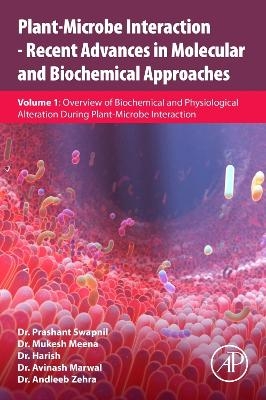
Plant-Microbe Interaction - Recent Advances in Molecular and Biochemical Approaches
Academic Press Inc (Verlag)
978-0-323-91875-6 (ISBN)
The book covers biochemical processes such as physiological, metabolic, etc. of plant and microbe interactions, the biochemistry of biological systems, the interaction of biological systems above-ground or within the rhizosphere, and the history of growth promoting microbiomes, their roles in phytoremediation efficiency, physiological and biochemical studies, chemical communication and signaling mechanisms.
Dr. Prashant Swapnil is Assistant Professor in the Department of Botany, Central University of Punjab, Department of Botany, Punjab, India; Dr. Mukesh Meena is Assistant Professor, Department of Botany, Mohanlal Sukhadia University, Udaipur, India; Dr. Harish is Assistant Professor, Department of Botany, Mohanlal Sukhadia University, Udaipur, India; Dr. Avinash Marwal is based at the Department of Biotechnology, University College of Science, Mohanlal Sukhadia University, Udaipur, India; Dr. Selvakumar Vijayalakshmi is based at the School of Food Science and Biotechnology Kyungpook National University, Republic of Korea; and Dr. Andleeb Zehra works at the Department of Botany, Institute of Science, Banaras Hindu University, India. Mukesh Meena is an assistant professor at the Department of Botany at Mohanlal Sukhadia University, Udaipur, Rajasthan, in India. His areas of research and work expertise are; plant-microbial interactions, fungal biology, toxic metabolites, plant-pathogen interaction, plant growth promoting microbes, fungal bio-molecules, induced resistance, programmed cell death, biological control, rhizobacteria, environment, heavy metal stress, and molecular markers. He has been honored with several fellowship awards in his career including Rajiv Gandhi National Fellowship (RGNF), UGC Research Fellowship in Science. He has authored several research articles related to isolation and characterization of fungal toxins, applications of fungal glucose oxidase, fungal toxins, production and technological applications of enzymes from microbial sources, beneficial microbes for disease suppression and plant growth promotion. He has published more than 80 peer reviewed international publications and more than 45 book chapters. He has also published three books with international publishers. Assistant Professor Dr. Harish works in the Department of Botany at Mohanlal Sukhadia University, Udaipur, Rajasthan, India. Avinash Marwal works in the Department of Biotechnology, Vigyan Bhawan - Block B, New Campus at the University College of Science, Mohanlal Sukhadia University, Rajasthan, India. Selvakumar Vijayalakshmi works as a Senior Researcher for Food science and Biotechnology at School of Agricultural and Life Sciences, Kangwon National University, Chuncheon-si, South Korea. Andleeb Zehra works in the Department of Botany at the Institute of Science, Banaras Hindu University, India.
1. Background and history of growth promoting microbiomes
2. Role of plant growth promoting microorganisms in phytoremediation efficiency
3. Biochemical process associated with plants and beneficial microbes
4. Physiological and biochemical studies of plant-pathogen interactions
5. Chemical communication between plant roots and microbes within the rhizosphere
6. Calcium/calmodulin-mediated signalling mechanism of symbiotic relationship in between plants and microbes
7. Role of phytohormones in plant-microbe interaction
8. Advance study of plant-microbe interaction in photosynthesis
9. Biochemical and molecular approaches in evolution of plant–microbe interactions
10. Manipulation of cell wall polymers and their enzymes during plant–microbes interactions
| Erscheinungsdatum | 21.04.2023 |
|---|---|
| Zusatzinfo | 20 illustrations (10 in full color); Illustrations |
| Verlagsort | Oxford |
| Sprache | englisch |
| Maße | 152 x 229 mm |
| Gewicht | 450 g |
| Themenwelt | Naturwissenschaften ► Biologie ► Botanik |
| ISBN-10 | 0-323-91875-1 / 0323918751 |
| ISBN-13 | 978-0-323-91875-6 / 9780323918756 |
| Zustand | Neuware |
| Informationen gemäß Produktsicherheitsverordnung (GPSR) | |
| Haben Sie eine Frage zum Produkt? |
aus dem Bereich


